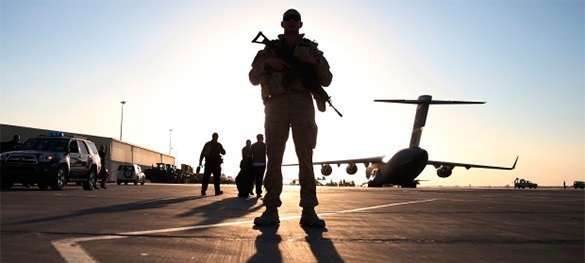NATO playing Russian roulette
By Dave Harrison

In Sun Wu's Art of War written in the 5th Century BCE, its thirteen chapters are considered the definitive works of military strategies even today and have been adapted to politics, business, and legal manoeuvres. Even though its author could never have imagined our apocalyptic, modern-day weapons, its early chapters - which deal with positioning strategies giving one side an advantage over its enemy - are still relevant.
In the case of the US and Russia, these military strategies have been applied since 1945 with the US and Nato doing everything in their power to isolate and contain the Soviets under Stalin, his successors, and now present-day Russia under Putin. Today, containment of Russia is still considered a first-order priority for Western freedom and democracy.
Although these efforts were successful during the Cold War, the fall of the Iron Curtain and the Berlin Wall, Glasnost, and Perestroika, its successes may have lulled the West into a false sense of superiority and invincibility which may prove to be its undoing.
With the dissolution of the Warsaw Pact and the immediate absorption of most of its East European countries into Nato to bolster the West's position against Russia, this 'Wall of Containment' may ultimately backfire.
Placing the Aegis anti-missile shield in Romania, Poland, the Mediterranean and former East Bloc countries is today being interpreted by Russia as a direct threat and provocation. This immediately brings to mind the October Missile Crisis of 1962 when medium-range, nuclear-tipped missiles placed in Turkey - aimed at Russia - were matched by Soviet, medium-range, nuclear-tipped missiles in Cuba - aimed at the US.
It was these tit-for-tat tactics which brought the world to the brink of nuclear destruction then, and today the scenario may play out with 'déjà-vu all over again'. The West cannot expect Russia to stand idly by; if they believe this, they neither understand Slavic mentality nor Slavic determination - something which Hitler tragically learned the hard way during WWII.
The ABM missile treaties of the early 1990s between Russia and America have always been tenuous with neither side trusting the other. And although atmospheric testing is no longer an issue on either side, the attempt to contain, isolate, hamstring, and dominate Russia politically, culturally and economically as a Western strategy is both dangerous and unwise - hence the 'blow-back'.
The US and its Nato allies should seriously re-evaluate its containment strategy. The Russians and Soviets have been badly underestimated in their resolve in the past and the West appears to be falling into the same trap as past, military invaders. Sun Wu's strategies warn about believing that an opponents 'weaknesses' - which may be its strengths - and its 'strengths' - which may be its weakness - as certainties. Misconstruing which is which may be fatal.
A look at European history and study of Napoleon's invasion of Russia illustrates how badly he misjudged and misconstrued his enemy in an effort to dominate Europe, East Europe, and Central Asian. And, in 1941, Hitler also believed that Russians were 'pushovers' and that his 'blitzkrieg' tactics would result in a speedy capitulation. Both misjudged; both were wrong. Today's situation is not much different.
America and its Nato allies believe they have hemmed in the Russians in the Baltic, the Black Sea, the Mediterranean, the Arctic, and the North Pacific using its naval forces equipped with their state-of-the-art weapons. Together with an anti-missile shield in countries bordering Russia can only be interpreted as another provocation against that sovereign state which will undoubtedly lead to testy countermeasures.
Furthermore, believing that support in East European, Nato partners is 'firm' is a huge miscalculation. Popular support for America's global military actions and foreign policies is low, and support for Nato is tentative at best. Coupled with US actions in the South China Sea and the Taiwan Strait may simply encourage the Russians and Chinese to form a new Sino-Russo Alliance which will flame the embers of a new Cold War, and shift the 'Balance of Terror'.
Cornering a bear is never a wise strategy. Ultimately, this type of Nato tactic will prove to be politically and militarily unproductive, contentious, provocative and highly dangerous, and will simply drive the world toward another nuclear precipice.
Dave Harrison
Canada
Subscribe to Pravda.Ru Telegram channel, Facebook, RSS!




